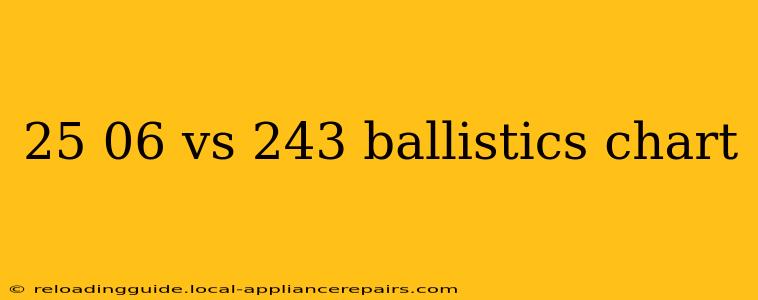Choosing the right cartridge for hunting or target shooting can be a complex decision, often hinging on subtle differences in ballistics. This detailed comparison focuses on the popular .25-06 Remington and .243 Winchester cartridges, analyzing their performance characteristics to help you make an informed choice. We'll delve into ballistics data, practical applications, and ultimately, which cartridge might be the better fit for your needs.
Ballistics Comparison: .25-06 Remington vs. .243 Winchester
Directly comparing ballistics requires considering several factors, including bullet weight, bullet type, and barrel length. The following data represents general trends based on commonly available factory ammunition. Specific values may vary slightly depending on the manufacturer and load.
| Cartridge | Caliber | Bullet Weight (grains) | Muzzle Velocity (fps) | Muzzle Energy (ft-lbs) | Recoil (ft-lbs) |
|---|---|---|---|---|---|
| .25-06 Remington | .257" | 87-120 | 3000-3300 | 2400-3200 | Moderate-High |
| .243 Winchester | .243" | 90-100 | 2800-3200 | 1800-2600 | Moderate |
Note: These are representative values. Consult individual ammunition manufacturer's data for precise specifications.
Key Ballistic Differences Explained
-
Caliber: The .25-06 Remington (.257") has a larger diameter bullet than the .243 Winchester (.243"). This translates to a larger wound channel, potentially resulting in more effective hunting performance on larger game.
-
Muzzle Velocity & Energy: The .25-06 generally exhibits higher muzzle velocity and energy, especially with heavier bullets. This increased energy contributes to flatter trajectory and greater downrange effectiveness. However, the .243 Winchester offers a good balance between velocity and recoil.
-
Recoil: The .25-06 Remington produces noticeably more recoil than the .243 Winchester. This is a crucial consideration for shooters, particularly those new to rifles or with less upper body strength.
-
Trajectory: Due to its higher velocity and energy, the .25-06 Remington generally maintains a flatter trajectory at longer ranges. This makes it more suitable for shots at extended distances.
Practical Applications: Hunting and Target Shooting
The choice between the .25-06 and .243 Winchester often depends on the intended use:
Hunting:
-
.25-06 Remington: Excellent choice for medium-to-large game like deer, antelope, and even some species of elk. Its higher energy offers increased stopping power.
-
.243 Winchester: Well-suited for deer-sized game and smaller animals. Its lower recoil makes it a popular choice for new hunters and those preferring a lighter-recoiling cartridge.
Target Shooting:
Both cartridges are suitable for target shooting, but the .243 Winchester's lower recoil might be slightly preferred for extended practice sessions. Accuracy potential is comparable for both, depending on the rifle and ammunition used.
Conclusion: Which Cartridge is Right for You?
The "better" cartridge depends entirely on your specific needs and priorities.
-
Choose the .25-06 Remington if: You need higher energy and flatter trajectory for hunting larger game, and you're comfortable with a heavier recoiling rifle.
-
Choose the .243 Winchester if: You prioritize lower recoil, primarily hunt smaller to medium-sized game, or prefer a cartridge better suited for extended target shooting practice.
Ultimately, the best way to decide is to handle both rifles, consider your hunting targets, and potentially try shooting both cartridges at a range. This hands-on experience will help you determine which cartridge provides the optimal balance of performance and shootability for you. Remember to always practice safe gun handling and follow all applicable laws and regulations.

